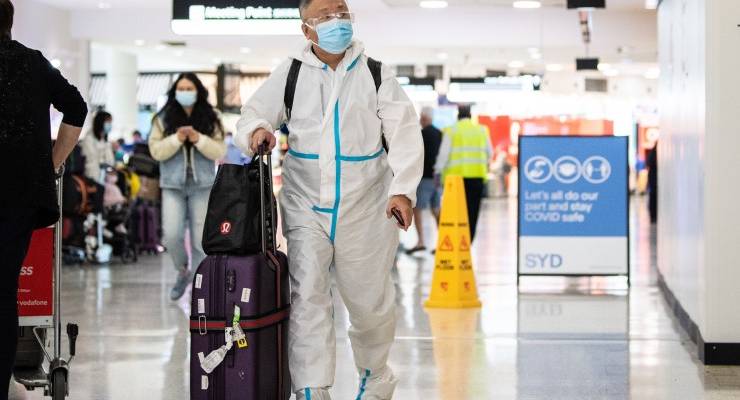
Panic over Omicron came swiftly. Mass media jumped on to reports of a new variant of the COVID-19 with more than 50 mutations circulating in South Africa. Next came an increase in cases in the country, followed by news it had spread to the UK and parts of Europe.
Governments acted quickly, closing borders to southern African countries and, in Australia, delaying the re-entry of visa holders by two weeks.
Living through two years of a global pandemic takes its toll, increasing anxiety and making people more reactive to bad news. While we still don’t know enough about Omicron to assess its impact on vaccines and transmissibility, we do know the world has been primed to descend into panic.
Can rapid antigen testing explain the panic?
As Crikey pointed out, coverage and panic over Omicron coincided with the inclusion of rapid antigen testing results in southern Africa, causing an expected one-off surge in reported cases.
This spike resulted in a case number anomaly on November 23, the day before the variant was detected. An official from the South African National Department of Health confirmed this one-day spike was entirely based on the inclusion of a significant number of historical rapid antigen tests that skewed the day’s numbers, and was unrelated to Omicron which was detected the following day.
But the timing of the artificial spike was unfortunate. It probably contributed to panic among observers who went looking for southern Africa’s case numbers after the variant was announced on November 24. With the mass of information available during a pandemic, it’s not hard to find a reason to panic when bad news breaks.
Was the panic warranted?
Should we be concerned about Omicron? Short answer: it’s too soon to say. Epidemiologist and biostatistician at the University of South Australia Professor Adrian Esterman tells Crikey that so far signs looked positive.
“There are signs Omicron might be more transmissible, but that won’t matter much if it’s less virulent,” he said. “While we don’t know that yet for sure, there’s anecdotal evidence from South Africa that it’s a milder strain.
“Our usual public health measures, high rates of vaccination, wearing masks indoors, social distancing, improved ventilation — all of those things should work just as well against this new Omicron variant as previous variants.”
A less virulent but more transmissible variant COVID-19 could be a good thing too: it could signal the virus is shifting to something more benign and, if people catch asymptomatic variants, it could help boost natural immunity.
But these developments have done little to quell public panic. The Daily Mail reported Christmas was at risk of being cancelled, and The Sun in the UK warned of a “mutant invasion” that would cause chaos. On social media, users lamented that lockdown was imminent and state borders would remain shut for Christmas.
The sharemarket tumbled: the ASX 200 fell 1.7% last week. State and International borders slammed shut.
After years of disappointment and false hope, our panic is a normal psychological response, but it’s not good for our mental health.
Pandemic-induced chronic stress
Co-director of health and policy at the University of Sydney’s Brain and Mind Centre Professor Ian Hickie tells Crikey how the pandemic has created a state of chronic unresolved stress, which is “much worse for us than acute one-off stressors”.
“One of the really problematic things about the whole pandemic is that it never really ends, the ups and downs [and] the roller-coaster of it all. Every time we think we’re close to being OK again, something new happens,” he said.
“This week it was the Omicron variant.”
So why does it feel harder and harder every time bad news breaks? Hickie says we are more susceptible to panic because we are sensitive to bad news around COVID.
“This is now a post-traumatic problem,” he said. “Once you’ve been sensitised by prior experience, you’re more likely to react when you run into the same thing again, even if it’s not as bad or not the same.”
It might not be the answer we’re looking for, but COVID will realistically never come to a satisfying conclusion. Shocks like these will pop up again and again, and because of our sensitised state this won’t be the last time we experience COVID-related panic.
More importantly, the vaccine race has left many countries trailing far behind, and the consequences of low vaccination rates in developing countries will mean outbreaks still happen, people still die, and COVID poverty becomes a new global crisis.








it’s completely reasonable to be cautious in the face of a new variant. Who can forget the results of Berejiklian’s complete lack of urgency in the face of Delta?
if Omicron turns out to be a mild one, i think people will breathe a sigh of relief, and continue on in the march towards normalcy.
i actually think a bigger prob would be if there’s one after, which is a terror, and people have been lulled into an omicron-sense of “not really paying attention anymore”.
on the plus side, we all at least know the drill now, so that will help in the face of any new covid variants, whatever their greek letter.
Agree completely Glenn.
Aussies were lulled into a false sense of security, for many weeks and months with the original virus strain, and, subsequently Delta …which many journalists and especially politicians and health department officials at the time noted, would primarily remain in India due to low vaccination rates, higher population, less stringent mask/lockdown mandates etc.
Already today, ABC News is suggesting Omicron may have been contracted “in the community” following advice from NSW health that a child who has not travelled overseas, nor had contact with anyone from overseas has tested positive to Omicron.
While I don’t think we should all panic about this latest variant, we should be aware and informed.
Good news thanks,
The nature of pandemic and virus is very familiar ,it’s just like how Newscorps operates,
“One of the really problematic things about the whole pandemic is that it never really ends, the ups and downs [and] the roller-coaster of it all. Every time we think we’re close to being OK again, something new happens,” he said.
Whether having been subject to the same strategy has been beneficial or not its hard to say, like watching trump, or scott sophist, inoculation to a virus doesn’t work on everyone if they’ve got it bad, Newscorpse is a co morbidity.